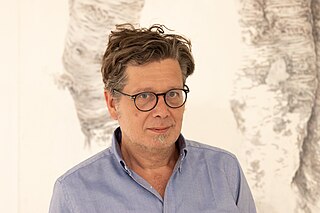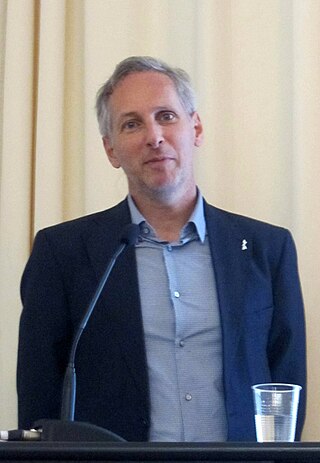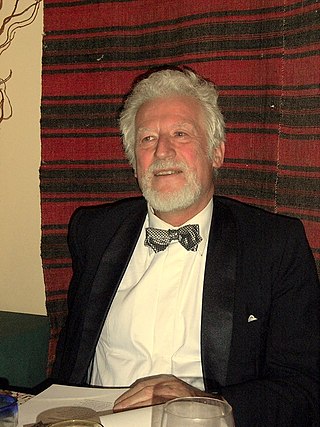Related Research Articles

Johann Christian Polycarp Erxleben was a German naturalist from Quedlinburg.

Franzobel is the pseudonym of the Austrian writer (Franz) Stefan Griebl. He was born on 1 March 1967 in Vöcklabruck. In 1997 he won the Wolfgang Weyrauch Prize and in 1998, the Kassel Literary Prize, amongst numerous other literary awards. In 2017, he won the prestigious Nicolas Born Prize and was long-listed for the German Book Prize for his novel Das Floß der Medusa. He now lives in Vienna.

Julia Voss is a German journalist and scientific historian. She is a writer and art critic who works at the Frankfurter Allgemeine Zeitung.

Karl Krolow was a German poet and translator. In 1956 he was awarded the Georg Büchner Prize. He was born in Hanover, Germany, and died in Darmstadt, Germany.

Dea Loher is a German playwright and author.

Gerhard Lauer is a German literary scholar. He is currently Gutenberg Professor of Book Studies at the University of Mainz. He works on literary history, reading studies, and digital humanities.
Benedikt Ledebur is a poet, essayist and critic based in Vienna, Austria.

Walter Hinck was a German Germanist and writer. He was professor of German literature at the University of Cologne from 1964 to 1987.

Peter Hamm was a German poet, author, journalist, editor, and literary critic. He wrote several documentaries, including ones about Ingeborg Bachmann and Peter Handke. He wrote for the German weekly newspapers Der Spiegel and Die Zeit, among others. From 1964 to 2002, Hamm worked as contributing editor for culture for the broadcaster Bayerischer Rundfunk. He was also a jury member of literary prizes, and critic for a regular literary club of the Swiss television company Schweizer Fernsehen.
Michael Maaser is a German historian, archivist of the Goethe University Frankfurt.
Notker Hammerstein is a German historian. His research interests are mainly in the field of University history and history of science as well as the history of the Holy Roman Empire of the German Nation.
Hans-Christof Kraus is a German historian.

Helmut Birkhan is an Austrian philologist who is Professor Emeritus of Ancient German Language and Literature and the former Managing Director of the Institute for Germanic Studies at the University of Vienna.

The Philosophicum Lech is a philosophical symposium in Lech am Arlberg in Vorarlberg (Austria). It has been established for the philosophical, cultural and social science reflection, discussion and encounter.

Lukas Bärfuss is a Swiss writer and playwright who writes in German. He won the Georg Büchner Prize in 2019.

Gerald Lembke is a German business economist with focus on digital media and non-fiction author.
Michael Ahlers is a German music educator.

Robert Schindel is an Austrian lyricist, director and author.

Konrad Paul Liessmann is an Austrian philosopher, essayist and cultural publicist. He is a university professor for "Methods of Teaching Philosophy and Ethics" at the University of Vienna. He officially retired in 2018, but continued his professorial activities at the University of Vienna on a special contract basis until the end of 2020.
Hartmut Lehmann is a German historian of modern history who specializes in religious and social history. He is known for his research on Pietism, secularization, religion and nationalism, transatlantic studies and Martin Luther. He was the founding director of the German Historical Institute Washington DC and was a director of the Max Planck Institute for History. He is an emeritus honorary professor at Kiel University and the University of Göttingen.
References
- ↑ "Roberto Simanowski". www.temporal-communities.de. 2020-06-16. Retrieved 2020-10-06.
- ↑ "kultur-online - Tractatus 2020 des Philosophicum Lech geht an Roberto Simanowski". kultur-online (in German). 2020-09-27. Retrieved 2020-10-06.
- ↑ "Der Tractatus - Philosophicum Lech". www.philosophicum.com. Retrieved 2021-06-02.
- ↑ "Conditio Humana". Conditio Humana. June 2019. s.a. conditio humana
- ↑ Simanowski, Roberto (2021). Digitale Revolution und Bildung Für eine zukunftsfähige Medienkompetenz. Juventa Verlag. Weinheim. ISBN 978-3-7799-6511-4. OCLC 1237704653.
{{cite book}}: CS1 maint: location missing publisher (link) - ↑ Simanowski, Roberto (2021). Das Virus und das Digitale (Deutsche Erstausgabe ed.). Wien. ISBN 978-3-7092-0463-4. OCLC 1244615021.
{{cite book}}: CS1 maint: location missing publisher (link) - ↑ "MIT Press Books Take Home CHOICE Awards". MIT Press. 2020-01-22. Retrieved 2020-10-06.